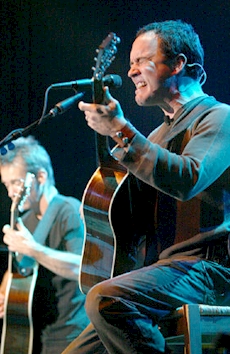The Dave Matthews Band is a band of unlikely sorts. Their music is folksy, yet they have a jazz quality as well. The cat-and-mouse styling of Dave Matthews places him in a category of his own. His unique approach to specific structures and chord voicings makes the band sound like no other. They incorporate horns, violins, keyboards, and ever-frequent jam sessions into their music. Dave Matthews has released a solo album entitled ” Some Devil,” and worked with Phish guitar player Trey Anastasio and Tim Reynolds, long-time friend, bandmate, and guitar demon.
How To Play It:
To begin the riff, you will need to keep one major factor in your head while playing. Notice on the tablature in all of the below measures that your 3rd finger never moves throughout the riff. Your 1st and 2nd fingers will be playing all of the notes that you see.
Overall Theme
This is basically the entire theme of the song. You can repeat this over and over until you come to the actual ‘mini-bridge’ which is shown further below.
As far as the actual vocal passage provided in the video, the numbers note the order in which you should play the walking bass notes.
- 1 stands for the “4” on the A string
- 2 stands for the “0” on the A string
- 3 stands for the “2” on the A string
- 4 stands for the “0” on the Low E string
- 5 stands for the “4” on the Low E string
- 6 stands for the “0” on the A string
- 7 stands for the “2” on the A string
- 8 stands for the “0” on the Low E string
In other words – you get 8 ‘counts’ for each passage in the lyrics. If you look closely at the tablature, you’ll see that all bass notes are quarter notes (except the last bass note progressing into each additional measure), which really just means you need to fill up the space for each bass note with a strumming passage. In the case of “Crash Into Me” you’ve got 1 bass note using quarter notes to start, then four strumming fills, followed by the bass note as an EIGHTH note, followed by three strumming fills.
Bridge
The bridge is much less complicated to actually play as opposed to what you see. The time changes look like they might be challenging, but as my video explains, you don’t HAVE to play it this way. You can simply play the D/F# and let it ring. You’ll feel when it’s time to come back in with the vocals. If you want to avoid the actual ‘time change’ look of the bridge, then play your little riff at the beginning that comes directly off the turnaround of the theme – then play the E chord, and then the D/F#. Bam! It’s easier now. If you can sing this and play the picking (AND stay in time) then by all means go for it. However, I don’t feel that it is truly necessary at all.
